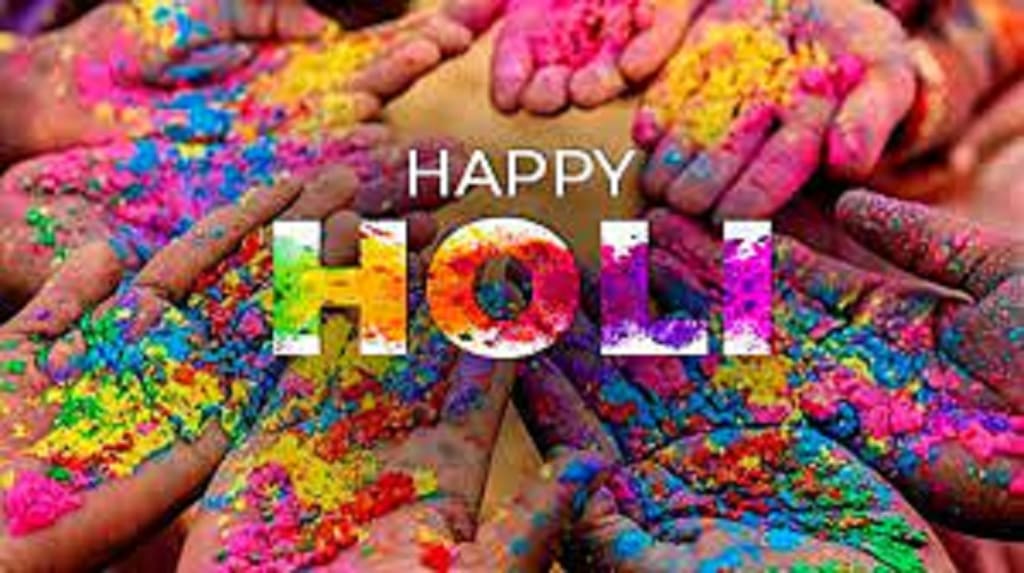Holi :-
Festival of Colors - Festival of Love !

Holi, also known as the Festival of Colors or Festival of Love, is one of the most popular and joyous festivals celebrated in India and other parts of the world. It usually falls in late February or early March, marking the arrival of spring and the end of the winter season.
The festival is celebrated with great enthusiasm and excitement, as people come together to spread happiness, love, and vibrant colors. The significance of the festival can be traced back to various mythological stories, including the legend of Prahalad and Holika, the demon king Hiranyakashipu and his son Prahlad, and the love story of Radha and Krishna.
The main ritual of the festival is the playing of colors, which involves throwing colored powder, called gulal, and colored water at each other. People also sing, dance, and feast on traditional delicacies like gujiya, mathri, and thandai. The festival is a time for forgiveness, reconciliation, and strengthening relationships.
Apart from being a fun-filled festival, Holi also has some health benefits. The colors used during the festival have medicinal properties, and can help in treating various ailments like cold, cough, and fever. The colors are made from natural ingredients like flowers, herbs, and fruits, which make them safe for the skin and environment.
However, with the increasing use of chemical-based colors and water guns, Holi has also become a cause of concern for the environment and public health. The synthetic colors used during the festival can cause skin allergies, respiratory problems, and water pollution. Therefore, it is important to celebrate the festival in an eco-friendly and safe manner, using natural colors and avoiding excessive use of water.
In recent years, Holi has gained popularity across the world, with people from different cultures and nationalities joining in the celebrations. The festival has become a symbol of unity, diversity, and cultural exchange. Many organizations and communities organize Holi events and parties, promoting social harmony and cultural awareness.
In conclusion, Holi is not just a festival of colors and love, but also a celebration of life, nature, and human connections. It reminds us of the importance of spreading happiness, forgiveness, and positivity, and of living in harmony with the environment and each other. Let us celebrate Holi with joy and responsibility, and make it a festival to remember for years to come.

One of the unique aspects of Holi is the role it plays in breaking down social barriers and promoting inclusivity. During the festival, people from all walks of life, regardless of caste, religion, or gender, come together to celebrate as one community. This spirit of unity and harmony is reflected in the popular saying, "Bura Na Mano, Holi Hai," which translates to "Don't mind, it's Holi!"
In addition to playing with colors, Holi is also a time for exchanging gifts and sweets with friends and family. People decorate their homes and streets with colorful decorations and floral garlands, adding to the festive atmosphere.
One of the most famous Holi celebrations takes place in the town of Mathura, located in the northern state of Uttar Pradesh. Mathura is believed to be the birthplace of Lord Krishna, and the Holi celebrations here are especially grand and festive.
Overall, Holi is a beautiful celebration of life, love, and happiness. It reminds us to let go of our differences and embrace the spirit of togetherness. By celebrating Holi in a responsible and eco-friendly manner, we can ensure that this vibrant and joyful festival continues to bring people together for generations to come.
Another important aspect of Holi is its cultural significance. The festival is not only celebrated in India but also in other countries like Nepal, Pakistan, Bangladesh, and parts of the United States and Europe. It has become a symbol of Indian culture and tradition, and is often featured in movies, music videos, and advertisements.
Holi is also a time for renewing relationships and building new ones. It is common for people to visit their friends and relatives during the festival, exchange greetings and gifts, and participate in the festive activities together. This helps to strengthen social bonds and promote a sense of community.
Furthermore, Holi is a time for reflection and introspection. It encourages people to let go of their past grievances and move forward with a positive outlook. It promotes the values of forgiveness, love, and peace, which are essential for building a harmonious society.
In recent years, Holi has also become an occasion for promoting various social causes. Many organizations use the festival as a platform to raise awareness about issues such as gender equality, environmental conservation, and community development. This has helped to make Holi a more meaningful and impactful festival, beyond its fun and festive aspects.
In conclusion, Holi is a festival that celebrates the beauty of life and the power of human connection. It is a time for spreading happiness, love, and joy, and for building strong relationships with our fellow human beings. By celebrating Holi with respect and responsibility, we can ensure that this colorful and vibrant festival remains an integral part of our cultural heritage for years to come.
-AR
About the Creator
Abdul Razack
Writing has been my passion. Fiction, poetry, and fanfiction are my favorite forms of storytelling. Writing movie reviews is something I enjoy doing.
Feel free to subscribe, leave a comment, and spread the love






Comments
There are no comments for this story
Be the first to respond and start the conversation.